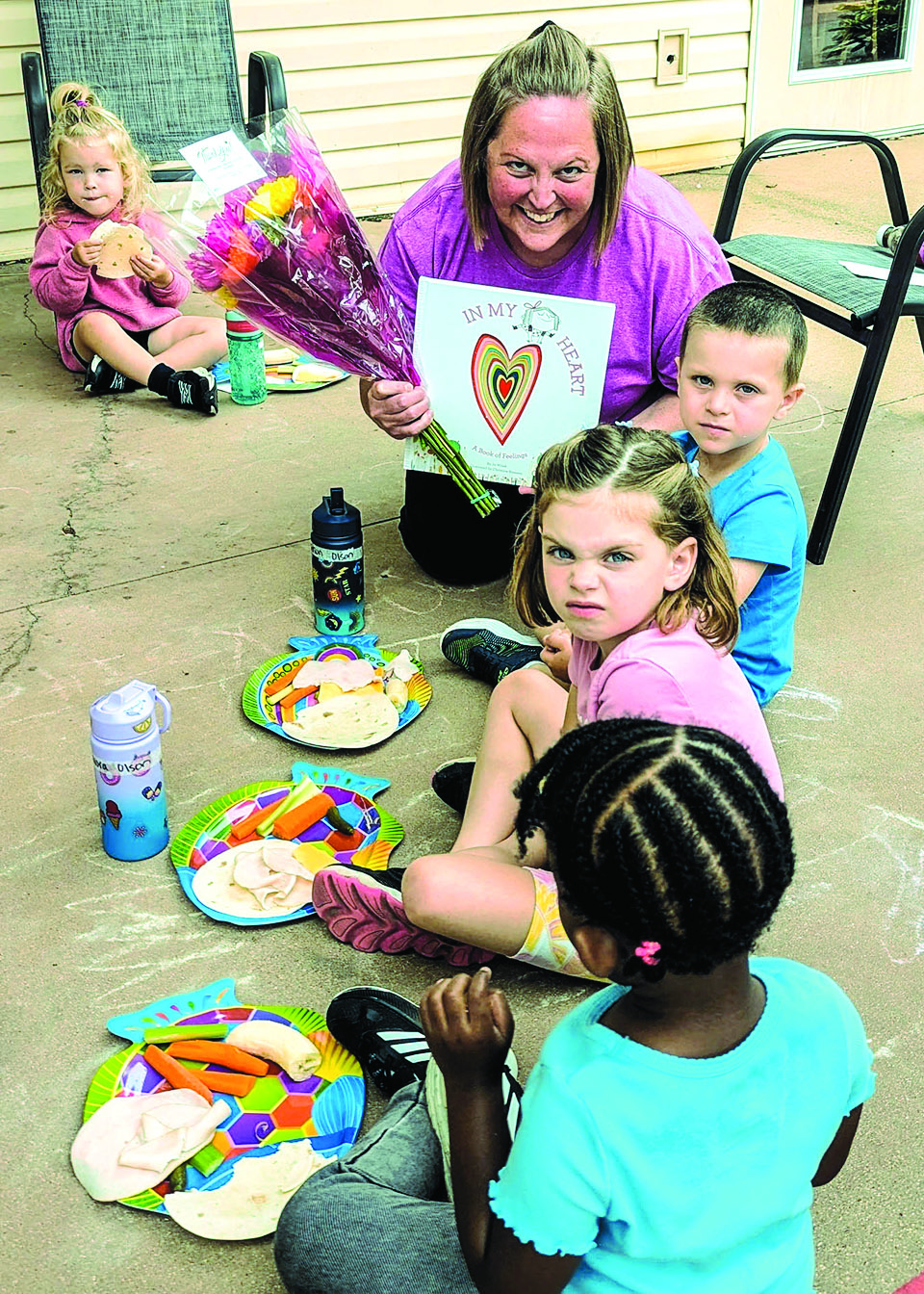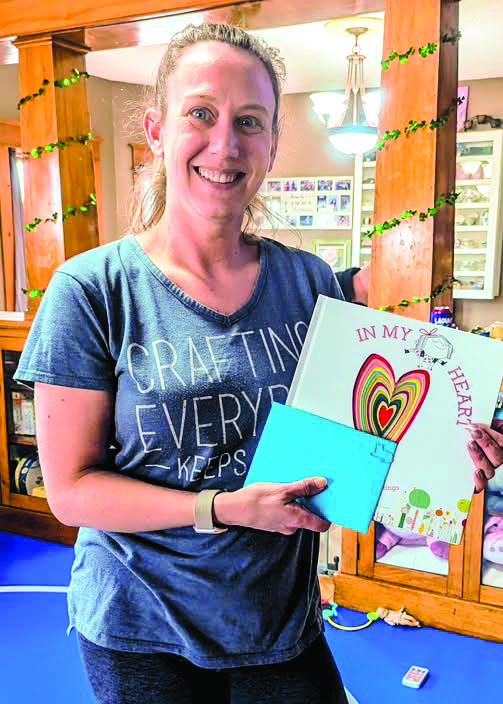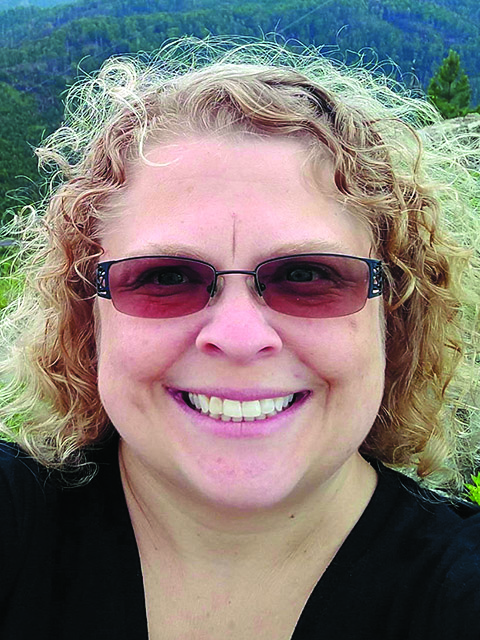
June CCECI childcare provider of the month — Serenity Kids, Dilworth, with co-lead teacher Jessica Schneider.
Nancy Edmonds Hanson
Child care is in short supply in Moorhead and its nearby neighbors. The Clay County Early Childhood Initiative is doing something about it.
The countywide network of parents and professionals is working to solve that problem. Established three years ago with funding from the West Central Initiative Fund in Fergus Falls, the local network brings together several dozen people whose focus is on children – parents, educators, businesses, community leaders, faith leaders, and policymakers – working to provide better lives for infants, toddlers and children up to school age.
Jody Jordet, who coordinates the group, lays out the challenge faced by parents of the very young. A 2024 study by First Children’s Finance, she says, documented that Clay County needed 1,345 more child-care slots than were available in the 16 centers and 130 home-care programs surveyed at that time. About 1,050 of those absent openings were within the city of Moorhead.
That spells out an acute need for expectant parents. She tells of one working mother who’s expecting her baby soon. “She began applying for infant day care when she was three months pregnant,” the ECI coordinator recounts. “That was five months ago. She has applications with nine providers, but – with delivery just a few weeks away – she’s still waiting.”
The child-care shortage, Jody notes, affects more than families who are searching for caregivers. “It’s an economic issue,” she points out. “It’s a workforce issue. We don’t have enough care providers right now, so many who’d otherwise be employed have to stay home to care for their kids. With developments like the SAF fuels plant on the horizon, that need is going to only get bigger.
“As Moorhead grows, so does the challenge.”
In 2024, the early-childhood advocates unveiled a multi-part plan to reverse that shortage. Their mission is to increase access to child care, both by retaining current providers and supporting the growth of new centers and home businesses. Its goals range from updating facilities for those currently providing child care to supporting newcomers.
Neither is a simple matter. “Child care is often a thankless job,” she observes. “Providers don’t make much of a profit, if any at all, especially home providers. They get into this through their love of children and the needs of the community … not as something to retire on.”
The Initiative debuted a new effort at the beginning of the year to provide tangible assistance. In its first round of grants, the group focused on concrete, immediate needs to upgrade the homes or facilities in which children are cared for. With an ultimate goal of $40,000, the fund was able to underwrite a first round this month totaling $12,000 for nine child-care providers
“Our grant committee focused on urgent improvements that had to be made to meet state licensing requirements,” Jody reports. “We hope to continue and expand our awards.”
One of the grants helped fund commercial-grade finger guards for a home provider. “Little fingers can get caught in those doors,” she points out. The provider was assisted with the cost of installing finger guards that meet fire-code standards.
Two other grantees used grants to repair and replace crumbling front steps on what was the homes’ only child-care entrances. A chain-link fence was installed around a care-giver’s yard near the busy Moorhead High School area; though the funding could only cover a portion of the cost, it helped the homeowner afford the barrier. Other grants funded radon mitigation in a basement child-care area and replaced damaged, dilapidated flooring in the area where children spent their day.
The July grants were covered, Jody says, by left-over COVID-era grants from West Central Initiative, provided to similar groups across the state by the McKnight Foundation. Moving forward, funding will have to come from corporate sponsors and individual donors. Donations to the Clay County Initiative Fund can be made online at https://wcif.org/fund/cce/.
Meanwhile, the Initiative continues to highlight needs through other programming. Early Childhood Initiative Meetings are held on the third Friday of each month from 11:30 a.m. to 1:30 p.m.; they’re open to everyone interested in child-care and workforce issues.
Recognizing and showing appreciation for Clay County’s often-overlooked child-care providers is among the group’s priorities. It awards a “provider of the month” bundle of books, flowers and resources. Recent winners include Paige Pickett of Dilworth in May, Serenity Kids in June, and Moorhead’s Nina Meis in July.
The collaborative network hosts two public events each year designed to support local families and raise awareness – KidsFest, the May event combining kid-friendly fun and resources at the Moorhead Public Library; and the Longest Table, a community-wide dinner coming up Sept. 15 at Trinity Lutheran Church. ECI also provides information on accessing free and reduced-price dental care.
Jody has worked with the Early Childhood Initiative for the past three years. She provided home-based child care herself for some 17 years, until the birth of her daughter. “I’ve lived and felt the struggle,” she confesses with a wry laugh. Today, in addition to CCECI, she works on a community life education for Safe Kids FM at Sanford Hospital.
For more information on resources for child-care providers and to contribute to the ECI Fund, she recommends following Clay County Early Childhood Initiative on Facebook.




